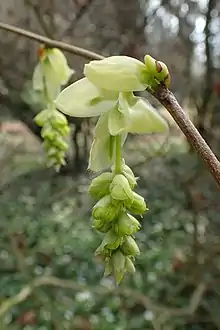| Corylopsis sinensis | |
|---|---|
 | |
| Scientific classification | |
| Kingdom: | Plantae |
| Clade: | Tracheophytes |
| Clade: | Angiosperms |
| Clade: | Eudicots |
| Order: | Saxifragales |
| Family: | Hamamelidaceae |
| Genus: | Corylopsis |
| Species: | C. sinensis |
| Binomial name | |
| Corylopsis sinensis | |
Corylopsis sinensis, the Chinese winter hazel (simplified Chinese: 蜡瓣花; traditional Chinese: 蠟瓣花; pinyin: là bàn huā),[2] is a species of flowering plant in the witch-hazel family Hamamelidaceae, native to western China. Growing to 4 m (13 ft) tall and broad, it is a substantial deciduous shrub. With ovate leaves, it produces delicately fragrant, drooping racemes of pale yellow flowers with orange anthers in spring.[3]
The Latin specific epithet sinensis means "Chinese" or "of China".[4]
There are four varieties and one form recorded:-[5]
- Corylopsis sinensis var. calvescens
- Corylopsis sinensis var. glandulifera
- Corylopsis sinensis var. parvifolia
- Corylopsis sinensis var. sinensis
- Corylopsis sinensis fo. veitchiana
This plant is cultivated as an ornamental. Though hardy down to −15 °C (5 °F), it prefers a sheltered spot in acidic soil. Both C. sinensis var. calvescens f. veitchiana[6] and C. sinensis var. sinensis[7] are recipients of the Royal Horticultural Society's Award of Garden Merit.
References
- ↑ "Corylopsis sinensis". World Checklist of Selected Plant Families. Royal Botanic Gardens, Kew – via The Plant List. Note that this website has been superseded by World Flora Online
- ↑ "Corylopsis sinensis". Flora of China – via eFloras.org, Missouri Botanical Garden, St. Louis, MO & Harvard University Herbaria, Cambridge, MA.
- ↑ "Corylopsis sinensis". Missouri Botanical Garden. Retrieved 3 May 2020.
- ↑ Harrison, Lorraine (2012). RHS Latin for Gardeners. United Kingdom: Mitchell Beazley. ISBN 978-1845337315.
- ↑ "Corylopsis sinensis". Tropicos. Missouri Botanical Garden.
- ↑ "Corylopsis sinensis var. calvescens f. veitchiana". RHS. Retrieved 12 April 2020.
- ↑ "Corylopsis sinensis var. sinensis". RHS. Retrieved 12 April 2020.